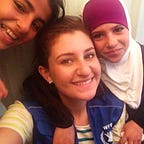Syrian refugee mother in Lebanon loses hope
One hand clutched onto the curtain, the other protecting her head, she crouched next to the sofa in her living room trying to protect herself from the rubble falling around her. This is how Fatmeh spent her final moments in Idlib, a city in northeastern Syria afflicted by the ongoing war. She now lives in a modest tented settlement in Mount Lebanon with her husband and two children.
Fatmeh recalls gasping for breath, ducking and crawling toward her husband Ahmad who was cradling their son Belal underneath the dining table when their neighbourhood in Idlib came under attack. They held each other until the shelling subsided and escaped that same day. The rest is all a blur.
“We had no choice. We had to leave,” Fatmeh explains. “The next thing I remember is climbing into a car that took us to the border and that’s where the real nightmare began.”
The brutal war in Syria has forced over one million Syrians to flee to Lebanon, where the bid for survival is growing bleaker by the day. The longer refugees stay in exile, the more vulnerable to hunger, illness and desperate they become.
It has been three years since Fatmeh and Ahmed arrived in Lebanon. During their first year, they could rely on humanitarian assistance to make ends meet, but when the humanitarian funding crisis began in 2013, all support stopped. A year later, their youngest son Moaz, was born and life became even harder.
At that time, the number of Syrian refugees receiving food assistance from the World Food Programme (WFP) fell by almost 30 percent in its initial efforts to prioritise those most in need. This year, as the crisis in Syria continues and funding challenges become more severe, WFP is prioritising the most vulnerable refugees for food assistance. This means that 50,000 refugees who can support themselves have stopped receiving support.
More about the cuts in food assistance
In January 2015, due to lack of funding, WFP was forced to reduce the amount of money loaded onto electronic food cards it provides for refugees from US$27 to US$19 per person each month. In July, deeper cuts were introduced, bringing the value down to US$13.5. Read the News Release.
This April, Fatmeh and Ahmad, living desperately, got the news that they would start receiving food assistance again, but it’s too little too late.
During their first year in Lebanon, Ahmad occasionally found work in construction or farming; this work is the reason why the family stopped getting external assistance. But the longer they stayed in Lebanon, the more these opportunities became scarce. To make matters worse, the couple had no choice but to skip meals, borrow and even beg for money and, worse, expose themselves to exploitative labour for low wages.
“Our son was born with heart complications and needs constant medical care, but we also need to eat to stay alive,” Fatmeh explained.
“When we can’t afford both medicine and food, I tie scarves around my boys’ bellies at night so they don’t wake up crying from stomach aches because they are hungry.” Fatmeh shares a common belief that tying something around your midsection would stave off hunger.
Fatmeh and Ahmad’s initial removal from humanitarian assistance put them on a downward spiral, pushing them into extreme poverty to a point that any extra shock could push them over the edge. These are the unintended consequences of reduced humanitarian assistance.
“Every time we take one step forward, we fall ten steps back. I have given up the hope that we will ever live normally again,” Fatmeh said, defeated. “I know the world has forgotten us too; we’re too much of a burden. They’ve given up on us too.”
In the middle of Ramadan, when refugees need support most, WFP in Lebanon has been forced yet again to reduce the amount of money it provides to Syrian refugees in Lebanon.
Story first published on wfp.org in 2015
